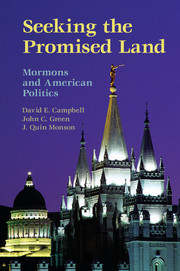1 - Meet the Mormons
Published online by Cambridge University Press: 05 August 2014
Summary
In 1996, Time magazine named Stephen R. Covey one of the twenty-five most influential Americans. His best-known book, The Seven Habits of Highly Effective People (1990), has long been a staple of bookstores and best-seller lists, having sold more than 25 million copies. Covey built a self-help empire teaching executives how to employ his habits to make an effective business. When he passed away in 2012, his New York Times obituary noted that “more than two-thirds of Fortune 500 companies” had sought his advice (D. Martin 2012). Covey also consulted with political leaders, winning praise from Democrats like President Bill Clinton and Republicans like Newt Gingrich. His advice even extended beyond the boardroom to the family room with a follow-up book on creating highly effective families (Covey 1997). With his bipartisan appeal, folksy wisdom, and sunny disposition, Covey was part Norman Vincent Peale, part Dale Carnegie.
Covey was also a Mormon, a member of the Church of Jesus Christ of Latter-day Saints. Far from merely a peripheral aspect of his life and work, Covey’s Mormonism served as the foundation for his famous seven habits. Fellow Mormon and Harvard Business School professor Clayton Christensen told the Economist that “the seven habits are essentially a secular distillation of Mormon teaching” (Economist 2012). Indeed, prior to writing The Seven Habits, Covey published a book for a Mormon audience, The Spiritual Roots of Human Relations (1970), which employed many of the same concepts.
- Type
- Chapter
- Information
- Seeking the Promised LandMormons and American Politics, pp. 3 - 24Publisher: Cambridge University PressPrint publication year: 2014

